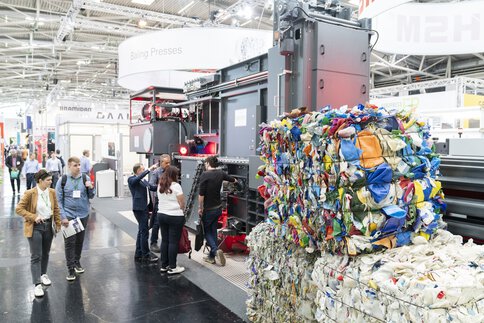Circular economy for plastics: There is cause for optimism
Dr. Ralf Düssel, Chairman of the Plastics Europe Deutschland association, gave an inspiring outlook on the future of the circular plastics economy in a lecture at IFAT 2024. Here are his key messages.
The circular economy is the central guiding principle for the plastics industry and a key component of all its strategic decisions. The aim of shifting from a linear economic model to a circular economy is to reduce waste, close plastic loops, and design products better in the long term. In addition, using recyclates, biomass and CO2 as non-fossil raw materials is an essential contribution to the European plastics manufacturers’ goal of becoming completely climate-neutral by 2050.
There are many challenges along that path. For the transformation to succeed, the players in the value chain need to move closer together. The investments required are huge: Plastics Europe predicts an amount in the double digit billion range in Germany alone. But we are already making good progress!
Germany as a living laboratory
If the German government succeeds in creating strong incentives for cross-technology investments, and makes it easier for companies to invest in the circular economy, Germany could become a living laboratory internationally for the circular economy. Germany has a technological lead over many other regions of the world in this area, which now needs to be expanded even further. For example, we already have a fully integrated value chain in the plastics industry: From producers and processors to recycling companies and machine builders—all the key players are on site. Universities, research institutes and NGOs are also actively driving the transformation to a circular economy. The physical proximity facilitates cooperation and promotes innovation.
All technologies already exist
We already have the technologies we need for the transformation to a circular economy. Many of them were even developed in Germany. Various measures must work together to achieve a climate-neutral circular economy. The Circular Economy PLUS mission statement of Plastics Europe Deutschland outlines the measures needed to make plastics production in Germany circular. Accordingly, circular product design plays a central role in the transformation. Products must increasingly be manufactured in such a way that they consume fewer resources, are used for longer, are ideally reusable and repairable, and can be optimally returned to the cycle at the end of their useful life. Investment incentives are needed to enable companies to convert their production processes accordingly.
Another key to the circular economy lies in mechanical recycling. Despite the existing infrastructure, only 33 percent of plastic waste in Germany was mechanically recycled in 2021, while a large proportion was disposed of by incineration. More investment must be made in more modern recycling and sorting facilities in order to achieve higher recycling rates in the long term. Ideally, mechanical recycling plants should be designed in such a way that they can also efficiently process complex plastic waste.
Chemical recycling additionally plays an important role, especially for plastics for which mechanical recycling reaches its limits, such as composite plastics and highly mixed plastic waste that have so far mostly been thermally recycled. Chemical processes can be used to treat these plastics and return them to the cycle. It is only by combining mechanical and chemical recycling that utilizing plastic waste can be maximized, and the use of fossil resources in the plastics industry can be effectively reduced.
In addition, biomass and carbon dioxide (CO2) must be increasingly used as alternative raw materials. Although the availability of biomass is limited, it will make a decisive contribution to compensating for material losses in the cycle. Another promising approach is the use of CO2 from industrial processes. Technologies such as carbon capture and utilization (CCU) can extract gas from sources like cement factories and use it to produce plastics, which also replaces fossil raw materials.

Bringing the entire value chain together
Close cooperation along the entire value chain is an essential factor for the success of the circular economy. Cooperation between producers, recyclers and the chemical industry has increased in recent years. One example of this is the joint declaration by plastics producers and recyclers, which calls for greater promotion of mechanical recycling while at the same time recognizing the importance of chemical recycling.
Politics also plays an important role. Despite often sluggish processes, there has been clear progress at national and European level. Regulations such as the EU Packaging and Packaging Waste Regulation (PPWR) set binding quotas for the use of recyclates in products, and create incentives for investment in new recycling technologies and in collection and sorting.
Circular economy and competitiveness go hand in hand
Technological innovation, political support, and greater collaboration within the industry provide a solid foundation for the transition to a sustainable, climate-neutral circular economy. Nevertheless, high energy and raw material prices, bureaucracy, and lengthy approval procedures pose major challenges for companies in Germany when it comes to the transformation. If the German government does not succeed in making the industrial location fit for the future, the urgently needed investments in the transformation to a circular economy could be delayed. Regaining competitiveness must therefore be a priority. That does not, however, mean compromising on sustainability. On the contrary, investments in green technologies are an important competitive advantage.

About the author
Dr. Ralf Düssel began his professional career in 1996 at Degussa Marl & Hanau. In 2001, he became site manager at Degussa Waterford in the U.S. before moving to Evonik in Essen in 2005. After holding several management positions within the chemical company, Düssel was responsible for the global high-performance polymers business at Evonik’s Marl site from 2018 to 2023 before assuming the role of Head of Sustainability. He is also a member of the Steering Board of the pan-European association Plastics Europe in Brussels and Chairman of Plastics Europe Deutschland.
